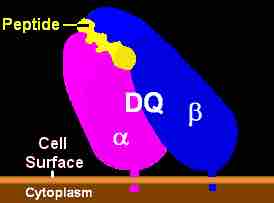Several mechanisms are thought to be operative in the pathogenesis of autoimmune diseases, against a backdrop of genetic predisposition and environmental modulation. Four of the important mechanisms are described below.
T Cell Bypass
A normal immune system requires the activation of B cells by T cells before the former can produce antibodies in large quantities. This requirement of a T cell can be bypassed in rare instances, such as infection by organisms producing super-antigens, which are capable of initiating polyclonal activation of B cells, or even of T cells, by directly binding to the β-subunit of T cell receptors in a non-specific fashion.
T Cell to B Cell Discordance
A normal immune response is assumed to involve B and T cell responses to the same antigen, where B cells recognize conformations on the surface of a molecule for B cells, and T cells recognize pre-processed peptide fragments of proteins for T cells. However, there is no evidence that this response is required. All that is required is that a B cell that recognizes antigen X endocytoses processes a protein Y (normally =X) and presents it to a T cell. Roosnek and Lanzavecchia showed that B cells recognizing IgGFc could get help from any T cell that responds to an antigen co-endocytosed with IgG by the B cell as part of an immune complex. In coeliac disease it seems likely that B cells that recognize transglutamine tissue are helped by T cells that recognize gliadin.
Aberrant B Cell Receptor-Mediated Feedback
A feature of human autoimmune disease is that it is largely restricted to a small group of antigens, several of which have known signaling roles in the immune response (for example DNA, C1q, IgGFc, Ro, Con. A receptor, Peanut agglutinin receptor(PNAR)). This fact gave rise to the idea that spontaneous autoimmunity may result when the binding of antibody to certain antigens leads to aberrant signals being fed back to parent B cells through membrane bound ligands. These ligands include B cell receptor (for antigen), IgG Fc receptors, CD21 (which binds complement C3d), Toll-like receptors 9 and 7 (which can bind DNA and nucleoproteins) and PNAR. More indirect aberrant activation of B cells can also be envisaged with autoantibodies to acetyl choline receptor (on thymic myoid cells) and hormone binding proteins. Together with the concept of T cell-B cell discordance, this idea forms the basis of the hypothesis of self-perpetuating autoreactive B cells. Autoreactive B cells in spontaneous autoimmunity are seen as surviving because of subversion both of the T cell help pathway and of the feedback signal through the B cell receptor. This reaction thereby overcomes the negative signals responsible for B cell self-tolerance without necessarily requiring loss of T cell self-tolerance.
Dendritic Cell Apoptosis
Immune system cells called dendritic cells present antigens to active lymphocytes. Dendritic cells that are defective in apoptosis can lead to inappropriate systemic lymphocyte activation and consequent decline in self-tolerance.
HLA-DQ (DQ) is a cell surface receptor type protein found on antigen presenting cells. DQ is an α heterodimer of the MHC Class II type . The α and β chains are encoded by HLA-DQA1 and HLA-DQB1, respectively. These two loci are adjacent to each other on chromosome 6p21.3. Both the α-chain and β-chain vary greatly. A person often produces two α-chain and two β-chain variants and thus four DQ isoforms.

MHC Class II, DQ
HLA-DQ (DQ) is a cell surface receptor type protein found on antigen presenting cells (APC). DQ is an alpha-beta heterodimer of the MHC class II type.
DQ isoforms can bind to and present foreign and self antigens to T-cells. In this process T-cells are stimulated to grow and can signal B-cells to produce antibodies. DQ therefore is involved in recognizing common self-antigens and presenting those antigens to the immune system in order to develop tolerance from a very young age. When tolerance to self proteins is lost, DQ may become involved in autoimmune disease. Two autoimmune diseases in which HLA-DQ is involved are celiac disease and diabetes mellitus type 1. DQ is one of several antigens involved in rejection of organ transplants. As a variable cell surface receptor on immune cells, these D antigens, originally HL-A4 antigens, are involved in graft versus host disease when lymphoid tissues are transplanted between people.